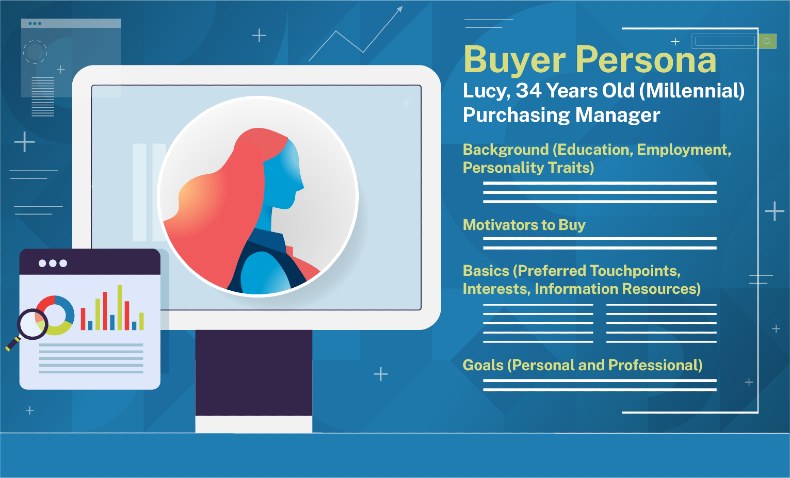For any business to be successful, it has to understand its customers: their wants, needs, pain points, interests, and more.
One way of understanding your customers is to craft fictional representations of them. Those representations are known as buyer personas.
Buyer personas are an integral part of not only a marketing strategy but also a brand strategy. In this article, we'll break down why buyer personas are important and how business leaders can better understand their customers.
1. What are buyer personas?
Buyer personas are all about understanding what your buyers want and who they are. What do they like? What do they dislike? Where do they like to shop? What do they do for fun?
Buyer personas allow you to tap into stories, messages, and various channels that might interest your audiences, to get them involved with your brand.
Personas help you understand the types of people who are likely to be interested in your product or service. They are useful for communicating to a certain group of people by using targeted messaging and marketing.

2. Why are buyer personas important to brands?
Understanding buyers—not just their behavior or what they care about but also what they value most—helps grow your business. It helps you design campaigns and craft the right messaging or product mix.
When you start to understand who your buyers are, you better understand how to develop your strategy. It helps to answer questions, such as "What new products should we launch?" and "How do I allocate my budget to respond to the buyers the right way?"
Beyond strategic planning, personas also inform the activities, calls to action, information architecture, and nomenclature that you use for your platforms, such as websites and apps. They can also help focus your marketing initiatives, marketing messages, and channels.
Part of a persona is a description of what your customers' values and preferences are—not only for messaging and use of the product or service but also for the channels through which those customers consume media.
A younger persona may be more digitally savvy, and an older persona may be more traditional. That affects your strategies for communications: what you say, how you behave, and how you deliver information to them.
Personas also make everything more efficient in the long run. You'll find customers faster, they'll pay more for your offering, and they'll be more loyal to you—because you're not wasting resources trying to attract the wrong type of customers.
3. Who needs personas, and why?
Regardless of whether you're a B2B or B2C company, you need to understand your customers.
Your buyer is likely different from your competitor's buyer. And there's a reason for that: The DNA of your organization is different from your competitor's, and its offering is something that's likely different from what you're offering.
If you want to grow organically or attract clients who already subscribe to a particular mindset, you can go out and replicate that experience. You can refine that experience for them and for others.
If you begin to develop the experience, structure, and content for a brand or company and you don't have personas, you're not really seeing the brand through the eyes of the actual end-user. So, when you develop a persona, what you're really trying to do is to develop empathy for your audience. Personas help to ensure you're really looking through customers' eyes.
4. How do personas improve brand and marketing strategy?
Customer personas and data help align operations within the organization; they also help executive management in the strategic planning processes. Executives often go about strategic planning from an internal perspective as opposed to a customer perspective. But when you have well-defined customer personas, you know exactly what drives value for your audience.
Personas are a way to ensure that you're staying on target with the needs of that user or customer. If you've built out personas the right way, they should be based on interviews with the target audience. They should never be based on any kind of assumption.
In some cases, especially for B2B companies, it may be more difficult to develop full-fledged personas. Digging into research or information from surveys can help inform the development of your personas.
Personas should be the ultimate outcome of lots of research and discovery. Once you establish personas, they're not one-and-done. Just like real-world people, they change; so, your personas have to be flexible.
For any type of strategy or tactic you build out, you should look back to your personas and ask, "What are they looking for? What are they trying to achieve? How is that tied into those higher-level challenges? How can we help them achieve their desired end result?"
5. Where should you start when developing buyer personas?
Your research, including how you conduct it, is pivotal, as that will be the basis from which you build your personas.
A business may want to look externally to get as much data as it can on its audience. If you're bringing a new product to market, or you already have a product and you want to adjust it, you need to take that market data and use it to answer questions such as the following:
- To whom do you really want to sell?
- To whom should you be selling for the best margin?
- What's going to delight customers the most without your having to change your operations too much?
- What do you believe this product's value is?
- To whom do you believe it has value?
If you don't work with an agency that has a UX practice, you should consider incorporating user experience and UX methodologies into your company. If you base your customer's experience on what the company's CEO or the VP of operations thinks, it'll likely be completely off.
A lot of things need to be taken into consideration when developing a persona. If you make up a persona that doesn't fit and you build all of these services around that or update a product based on those assumptions, you risk wasting a lot of time and money.
Ready to find your audience?
Hopefully, we've explained why buyer personas are important for companies. If you want to learn more about creating brand believers, identifying important customer metrics, mapping your value chain, or how to find multiplier customers, check out these resources:




